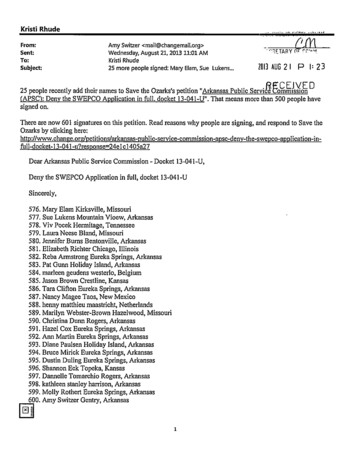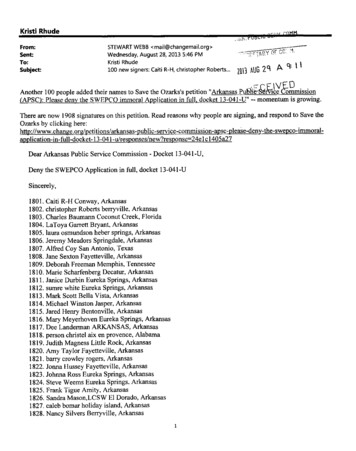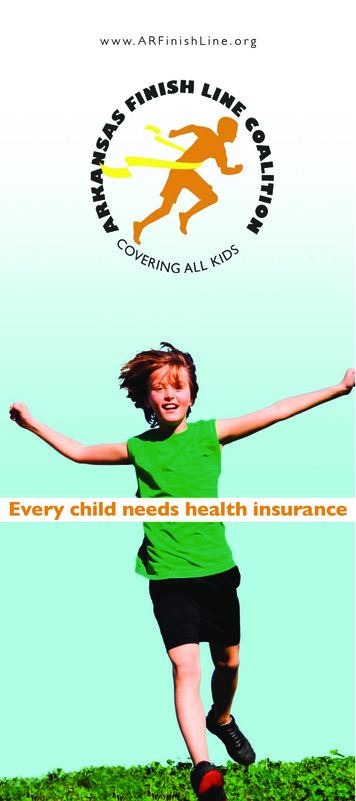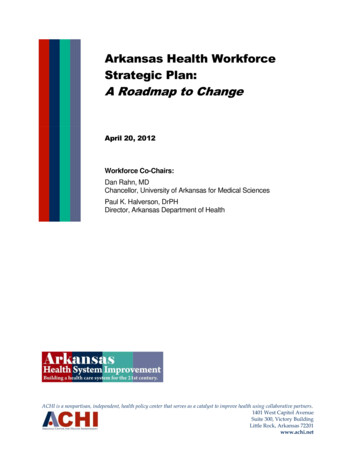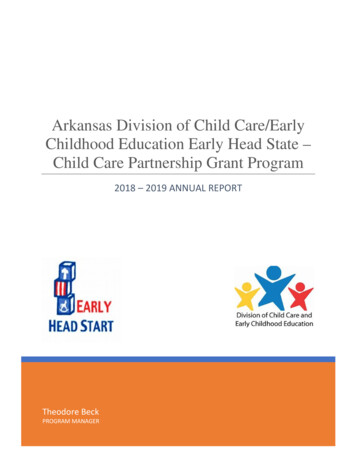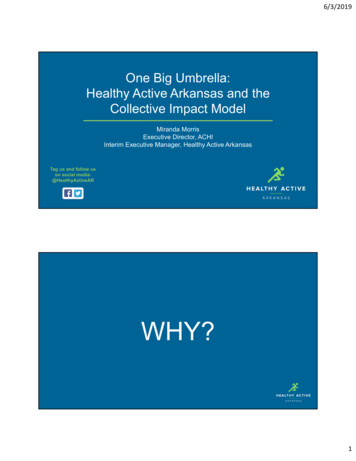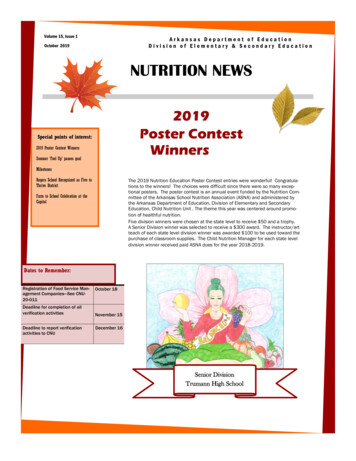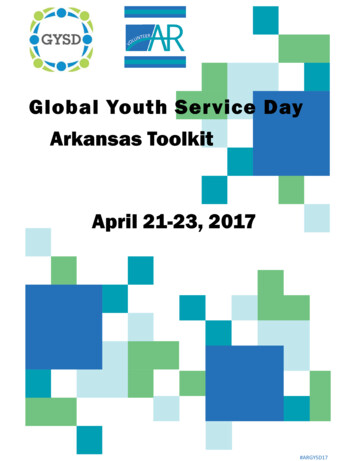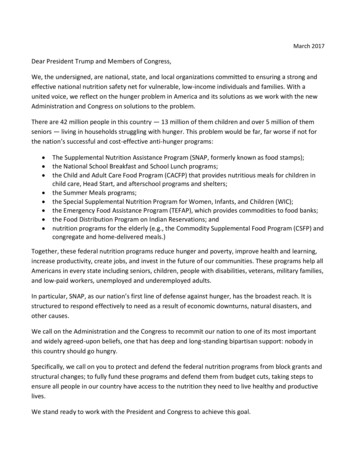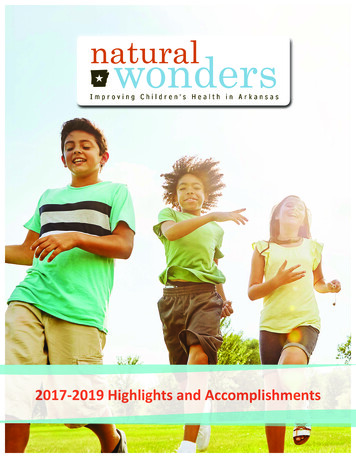
Transcription
2017-2019 Highlights and Accomplishments
About the CouncilThe Natural Wonders Partnership Council (NWPC) is a coalition of diverse child healthorganizations, nonprofits, agencies and funders that work together to address the changinghealth needs of children. Arkansas Children’s Hospital serves as the backbone entity for this groupby planning, managing, and supporting NWPC’s efforts through financial, administrative, logistic,and evaluative support.Arkansas Access to JusticeArkansas Advocates for Children and FamiliesArkansas Asset Funders NetworkArkansas Association of Educational AdministratorsArkansas Blue Cross and Blue ShieldArkansas Campaign for Grade-Level ReadingArkansas Center for Health ImprovementArkansas Chapter, American Academy of PediatricsArkansas Coalition for Obesity PreventionArkansas Community FoundationArkansas Department of EducationArkansas Department of HealthArkansas Department of Human ServicesArkansas FoodbankArkansas Foundation for Medical CareArkansas Hospital AssociationArkansas Hunger Relief AllianceArkansas March of DimesArkansas Minority Health CommissionArkansas Out of School NetworkArkansas Pharmacist AssociationBlue & You Foundation for a Healthier ArkansasClinton FoundationClinton School of Public ServiceCommunity Health Centers of ArkansasDelta Dental of ArkansasJust Communities of ArkansasOur HousePulaski County Circuit Court Juvenile DivisionUniversity of Arkansas at Little RockUniversity of Arkansas Cooperative ExtensionUniversity of Arkansas for Medical SciencesThe Urban League of ArkansasWinthrop Rockefeller FoundationPage 1
OverviewThis report captures the impact of the Natural Wonders Partnership Council’s collectiveefforts over the past three years. The efforts of the NWPC cover ten issue areas, each ofwhich has shared measures and mutually reinforcing activities that are described in thisreport. The ten areas are: Access to Quality CareChild ObesityMental Health and Substance UseReproductive HealthSocial IssuesParenting SupportsOral HealthFood InsecurityChild InjuryImmunizationThe NWPC fully completed 80 percent of the mutually reinforcing activities for the 20172019 Action Plan as well as twenty-five Innovation Fund projects. A majority of the sharedmeasures, 70 percent, showed improvement from the baseline. The collective efforts ofall members of the NWPC contributed to the improvement of child health in Arkansas, asreflected in the shared measures. Our successes are thanks to the willingness of partnergroups to set aside their own agendas, when necessary, in the interest of improving thewellbeing of children across Arkansas.Collective ImpactShare of Mutually Reinforcing Activities fully completed by theNWPC during the 2017-19 period.40/50 (80%)Number of Innovation Fund projects completed by the NWPCduring the 2017-19 period.25Share of Shared Measurements that showed improvementduring the 2017-19 period (out of those with available data).33/47 (70%)Page 3
Collective Impact ModelThe NWPC uses the Collective Impact Model to guide the process and work of partners toimprove the health of all children in Arkansas. Below are the five key components of themodel and a description of how NWPC applies them to its work.Common Agenda: The statewide Community Health Needs Assessment (CHNA), preparedby Arkansas Children’s Hospital every three years, provides the information that helps allmembers of the NWPC establish a common understanding of child and adolescent healthneeds. NWPC uses this information to identify priority areas in which to focus efforts toimprove child health.Shared Measurement System: Custom leading indicators and process measures for eachsubgroup provide data on the priority issues. Together, these two data sets track progresstoward improved children’s health.Mutually Reinforcing Activities: Workgroups for each Natural Wonders priority area outlinemeasurable goals. These goals focus on processes or activities that will improve children’shealth.Continuous Communication: Monthly meetings of the primary NWPC group, regularworkgroup meetings, email communication, one-on-one meetings, and an independentpublic presence (website, social media) will help facilitate the conversation needed toimprove children’s health.Backbone Support Organization: Arkansas Children’s Hospital will continue to serveas the entity that will plan, manage, and support the NWPC’s efforts through financial,administrative, logistic, and evaluative support. With the growth of its Child Advocacy andPublic Health department, ACH now has more dedicated staff to support the work of theNWPC.Page 4
Access to Quality CareLead Organizations: Arkansas Advocates for Children and Families,Arkansas Department of HealthAccess to quality care allows all families to receive appropriate, convenient, affordable,and consistent health services, including preventive care and specialty care, vision andhearing screenings, and other developmental screenings and services. This also includesremoving barriers like transportation as well as language and cultural barriers.Shared MeasuresMetricBaselineCurrentPercent of uninsured kids under age 19Kids Count Data CenterPercent of Child Core Measures Arkansas is reporting to theCenters for Medicare and Medicaid ServicesPercent of children on Medicaid/ARKids First A who shouldhave received at least one screening and who actually receiveda screeningCenters for Medicaid and Medicare ServicesTotal annual Medicaid services billed for Early InterventionServicesNumber of School-based Health Centers and School-BasedTelemedicine sites.Arkansas Department of Health4.9%4%50%60%48%50%Not able to bedeterminedNot able to bedetermined1937Page 6
Innovation Fund Highlights2018 “FrameWorks: Reframing Child Health Communication in Arkansas”: The Frameworks Institutedeveloped evidence-based communication frames to create a new narrative about children’shealth in Arkansas. They also provided materials, education, and support to Natural Wondersmembers on this messaging. Through more informed and strategic framing and messaging, theNWPC is able to more effectively advocate for priority child health issues and their solutions.2019 Arkansas’s SBHC Start-Up Guide: The School-Based Health Alliance of Arkansas (SBHAAR) createda guide for schools, advocates and providers to navigate the process of initiating a School-Basedhealth care center.Mutually Reinforcing ActivitiesActivityCOMPLETED: Educate partners and convenethree meetings with administrative leadersto reporting about Core measure reporting.(AACF)COMPLETED: Educate partners and advocateto lawmakers to gain a state plan amendmentto implement the Immigrant Child HealthImprovement Act. (AACF)COMPLETED: Research and compile dataon adequate and timely services for EarlyIntervention and Mental Health services forchildren with developmental needs. (AACF, ARCampaign for Grade-Level Reading, ACH)COMPLETED: Educate practices servingchildren on billing appropriately for EPSDTs.(AFMC, Arkansas Children’s Care Network)PARTIALLY COMPLETED: Expand school-basedtelemedicine services to 40 schools in free/reduced price lunch school districts by August2018. (ACH, ADH, ADE)ImpactDHS is moving toward reporting on all coremeasures in the coming years.Arkansas Advocates and partners advocatedfor coverage for ICHIA, which passed duringthe 2017 legislative session.AACF released two separate reports andwork continues with the Pritzker Children’sInitiative to seek Medicaid payment fordevelomental screenings and improved carecoordination for children with disabilities.EPSDT rates improved based on 2016data from AR Medicaid following providerconsultation on coding.School-Based Telemedicine is currentlyoffered at approximately 10 districts throughACH and UAMS. Act 203 of 2017 from theAR General Assembly slowed expansion.Page 7
Child ObesityLead Organizations: Arkansas Coalition for Obesity PreventionChild Obesity is most often defined in terms of excessive Body Mass Index (BMI) forthe child’s height and age. An elevated BMI carries risk of current and life-long healthissues. Children with healthy weights require healthy food options, safe places to play andexercise, and a community-based approach to family health.Shared MeasuresMetricNumber of K-8 teachers ACH provided with training inevidence based physical educationPercent of birthing hospitals in AR designated as babyfriendlyBaby Friendly USAPercent of Arkansas school children who are overweightor obeseACHIPercent of adolescents who participated in daily physicalactivity for at least 60 minutesYRBS (2015, 2017)Percent of public elementary school students activelyusing GoNoodle(2016, 2018)Page 8BaselineCurrent0300 5%18%39.2%39.4%28.6%21.4%68%61%
Innovation Fund Highlights2017 SPARK Training of Trainers for Physical Activity teachers in Delta: The Arkansas Department ofEducation povided quality professional development for physical educators, through the provisionof SPARK K-8 evidence-based curriculum and equipment for 40 Arkansas certified physicaleducation teachers in the Delta region2018 Double Up Food Bucks: The Arkansas Coalition for Obesity Prevention (ArCOP) increased accessto fresh fruits and vegetables among low-income Arkansans by doubling the spending power ofSNAP participants in the Delta Region with the Double Up model at various events: Ft. Smith (76and 95 participants) Rogers (49 participants) and Marshall (123 participants).2019 Growing Healthy Produce Nutrition Education: ArCOP provided nutrition education throughCooking Matters classes, evidence-based health education for children, Healthy Checkout Lanes,Double Up Food Bucks programs, and promotional activities.Mutually Reinforcing ActivitiesActivityImpactCOMPLETED: Expand the number ofdays per week that ACH’s patients canenroll in WIC while attending healthcareappointments.The Southwest Little Rock clinic opened nextdoor to the Arkansas Department of Healthlocal health unit in SWLR. Close coordinationprovides WIC accessibility for ACH patients in asecond location.COMPLETED: Train 300 K-8 teachers inADE reports that more than 300 teachers haveevidence based physical education. (ADE,been trained in SPARK, an evidence-basedACH, Blue & You Foundation)physical education program.COMPLETED: Ensure that 60% of schoolADE has awarded 222 JUA grants, reaching thedistricts will have a Joint Use Agreementmajority of school districts. Communities with(JUA) that increases opportunities forlimited resources have school facilities availablephysical activity. (ADE)for exercise and events that improve health forchildren.PARTIALLY COMPLETED: Ensure that 65% of Every elementary school in Arkansas is activeelementary classrooms in Arkansas will be with GoNoodle, and 93% of eligible elementaryactive with GoNoodle. (ACH)classroom teachers used GoNoodle at leastonce during the past school year. However, 49%of elementary classroom teachers actively usedGonoodle in the 2018-19 school year.PARTIALLY COMPLETED: Ensure that 25%Seven of Arkansas’s 40 birthing hospitals haveof birthing hospitals will designated babya baby-friendly designation, totaling 18%.friendly. (ArCOP)An eighth is expected to be certified in 2019.Administrative and financial barriers havelimited progress on this goal.Page 9
Mental Health and Substance UseLead Organizations: Arkansas Department of EducationMental health and substance use problems include depression, anxiety, suicide,tobacco, alcohol and illicit drug use. These issues effect entire families, not just individualparents or children. Children living in households with untreated mental health orsubstance use problems are more prone to Adverse Childhood Experiences (ACEs) andtheir profound lifelong health effects.Shared MeasuresMetricBaselineCurrentPercent of high school students using marijuanaYRBS (2013, 2017)Percent of high school students who drank alcohol in the last30 daysYRBS (2013, 2017)Percent of high schoolers who currently use cigarettes ande-cigarettes, respectively (at least once in last 30 days)YRBS (2015, 2017)Teens who abuse alcohol or drugsAECF37%31%36%26%16%/26%14%/14%6%4%16%Not able to bedeterminedNot able to bedeterminedNot able to bedeterminedPercent of pre-k children with significant behavioral concerns# of children receiving mental health services throughMedicaid annuallyPage 10
Innovation Fund Highlights2019 Arkansas School Nurse Mental Health Forums: The Arkansas Department of Education heldtwo School Nurse Mental Health forums in 2019 which were well attended and recievedpositive feedback. These forums provided school nurses with education and ongoing trainingopportunities for evidence-based mental health approaches such as “Seed Digging.” ACEs-focused Legal Aid, Phase 1- Legal Aid of Arkansas: Legal Aid of Arkansas provided ACEsspecific CLE training to 50 attorneys and educated 50 families about ACEs through outreachefforts on the availability of legal solutions to buffer against the impact of ACEs.Mutually Reinforcing ActivitiesActivityImpactCOMPLETED: Establish a new behavioral A new Natural Wonders behavioral healthhealth workgroup.workgroup has been established, focusing onschool and community interventions that promotepositive mental health outcomes.COMPLETED: Determine membershipMembership for NWPC behavioral healthand leadership of new behavioral health workgroup started with a steering committee but isworkgroup.growing.COMPLETED: Determine missionThe NWPC behavioral health workgroup is focusingand scope of new behavioral healthon school and community mental health andworkgroup.substance use interventions ranging from trainingschool personnel on evidence-based MentalHealth First Aid to Project Prevent youth tobaccoprevention, among others.COMPLETED: Develop messaging forFrameWorks, Inc. was engaged to test messagesbehavioral health needs in Arkansas.around child development and child well-being in(ACH)Arkansas. Many of the communication frames theysuggested support positive mental health, such asthe “resilience scale” or the “resource grid” thatunderscore the need for mental health to be partof the solution for child well-being.PARTIALLY COMPLETED: Conduct aA formal needs assessment was not completed, butneeds assessment regarding behavioral the steering committee continues to explore focushealth workgroup.areas for this group.Page 11
Reproductive HealthLead Organizations: Arkansas Department of Health, Arkansas Children’sHospitalPositive reproductive health includes avoidance of sexually transmitted infections, lowlikelihood of teen births and deterrence of sexual assault. These outcomes are driven byproviding appropriate health education, giving male and female youth the tools they needto have healthy relationships, and providing access to comprehensive health care servicesfor adolescents.Shared MeasuresMetricBaselineCurrentTeen Birth Rate (15-19) per 1,000 birthsASPIRE / AECF (2013, 2017)Percentage of Chlamydia infections in AR that affect 15-24 yearoldsADH STI Annual ReportPercent of high school students who have had sexual intercourseYRBS (2013, 2017)Percent of adolescents age 10-18 on Medicaid/ARKids FirstA who should have received at least one screening and whoactually received a screening (Participant Ratio)Children in Single-Parent Families (2014, 2017)AECFLow Birth Weight Babies (2014, ation Fund Highlights2017 Teen Pregnancy Toolkit Educator: David Monteith, Consultant, recruited four communities topilot the “Preventing Teen Pregnancy in Arkansas” toolkit created by Clinton School studentKathryn Baxter in 2016.2018 Love Notes pilot: David Monteith, Consultant, recruited 2 faith-based sites in addition to threeother sites willing to participate in evidence-based reproductive health training. Consultant alsosupported the implementation of the curriculum for 60 students.Page 12
Innovation Fund Highlights continued2018 Act 943 Action Plan Compliance Assessment: Legal Aid of Arkansas developed a toolkit to helpinstitutions evaluate their processes for complying with Act 943. This project aimed to benefitpublic two- and four-year colleges and universities in the state of Arkansas who have submittedaction plans to comply with Act 9432019 Faith-Based Love Notes: David Monteith, Consultant, continued work with the evidence-basedprogram, Love Notes, to reduce teen pregnancies and births in Arkansas. The program wasfocused towards faith-based leaders and churches and reached five community groups.Mutually Reinforcing ActivitiesActivityImpactCOMPLETED: Revise the AR Department ofNWPC Reproductive Health group membersEducation Frameworks with evidence-basedcontributed to the updated frameworkscontent and skills for reproductive health. (ADE) approved by the State Board of Education in2019.COMPLETED: Develop process and outcomeAn evaluation plan was developed andmetrics to evaluate Act 943 implementation of piloted through a Natural Wonderscollege and university action plans to reduceInnovation Fund project. The AR Departmentunplanned pregnancies for 18- and 19-yearof Higher Education is not monitoring theolds. (AR Campaign to Reduce Unplannedimplementation of this law per a recentPregnancy)inquiry.COMPLETED: Ensure that health care providers DHS engaged AFMC on a qualityhave been trained and educated on prescribing improvement project, resulting in evidencea range of birth control options, including long- based education materials distributed toacting reversible contraceptives (LARCs), andproviders and colleges and universities. Thebilling appropriately. (AFMC, ADH, Merck)Arkansas Department of Health now offersLARCs in its health units.COMPLETED: Determine the feasibility of aExplored strategy through presentation tomobile health van that provides comprehensive ACH senior leadership. Mobile reproductiveadolescent well care to teens in underservedhealth was determined to be politically andareas of Arkansas, including red counties. (ACH) logistically difficult.PARTIALLY COMPLETED: The Changing the Story Supported adoption of evidence-basedworkgroup will work with 15 communitiesreproductive health education (Loveto utilize the “Preventing Teen PregnancyNotes) with 14 schools, faith partners, andin Arkansas” toolkit to pilot evidence-basedcommunity groups over the past 3 years.programs. (Changing the Story, Women’sFoundation)Page 13
Social IssuesLead Organizations: Natural Wonders Partnership CouncilSocial issues that impact child health include poverty, low-quality and unstablejobs, housing instability, and low educational attainment. These issues are intertwinedwith child health, the wellbeing of parents, and the health and economic success ofcommunities.Shared MeasuresMetricBaselineCurrentPercent of children living in poverty in ArkansasAACF (2014, 2016)Percent of children living in households with a high housing costburdenKids Count (2014, 2017)Percent of children living in high poverty areasAECFAnnie E. Casey overall ranking26%24%28%24%17%14%44th40th52%53%Proportion of households living in liquid asset povertyProsperity Now (2011, 2014)Innovation Fund Highlights2017 Statewide Social Needs Screener Pilot: The Arkansas Foundation For Medical Care piloted astandard statewide social need screener in healthcare settings that serve children. Statewide Medical Legal Partnership (MLP) Network: Legal Aid of Arkansas created a statewidenetwork of MLPs that address health harming legal needs (e.g. benefits appeals, and evictions). Youth and Health Photovoice: A photovoice trainer helped local communities include the voicesof youth on how health impacts them, their family and community through visual images but wasnot fully completed.Page 14
Innovation Fund Highlights continued2018 Medical Legal Partnership (MLP) Summit: Legal Aid of Arkansas hosted a summit for active MLPs,and those interested in parterning. The summit also extended invitations to MLPs in surroundingstates.2019 Assessing School Readiness using the Early Development Instrument (EDI) - Arkansas Campaignfor Grade-Level Reading and Excel by 8 has engaged four counties and are now beginningoutreach on a second cohort. The EDI, a tool to assess school readiness at the neighborhood level,will be used to create maps and data analysis to target both education and health resources.Mutually Reinforcing ActivitiesActivityImpactCOMPLETED: Educate partners andAn EITC was introduced during the 2019 legislativeadvocate to lawmakers to implement a state session as part of a broader legislative package,Earned Income Tax Credit. (AACF)but unfortunately it did not pass. AACF hascontinued work to implement an EITC in Arkansas.COMPLETED: Establish a statewide Pro Bono ACH’s Medical Legal Partnership hosted anetwork of attorneys to expand Medicalstatewide training on MLPs that engaged almostLegal Partnership capacity to children across 100 attorneys, provided Continuing LegalArkansas.Education, and helped Legal Aid gain many probono volunteers, thanks to a Natural WondersInnovation Fund project.COMPLETED: Educate partners andThe Arkansas General Assembly passed a bill toadvocate to lawmakers to establishestablish four weeks of paid maternity leave forpaid leave in Arkansas. (AACF, Women’sstate employees.Foundation)COMPLETED: Pilot a social needs screenerSDOH screenings and partnerships areand referral to associated services in fourincorporated into primary care visits acrosscommunity primary care sites in Arkansas.Arkansas, and work continues to integrate the(ACH, AFMC)tool into EPIC medical records and to connectelectronically to community partners for referralsand follow-up.COMPLETED: Explore the healthACH is actively connecting its communityneeds of children in rural Arkansas bybenefit programs to the 4 current Excel by Eightconducting community conversationscommunities (Sevier, Monroe, Independence, andand interviews and compiling a reportConway counties with more to come).with recommendations for addressingcommunity concerns. (ACH, ACCN)Page 15
Parenting SupportsLead Organizations: Center for Effective Parenting at Arkansas Children’sHospital, Arkansas Department of HealthChildren need capable, loving parents who can support them physically, mentallyemotionally and financially. Supporting parents and primary caregivers means givingthem the tools to improve their parenting or caregiving skills (such as parentingprograms, home visiting programs and teen parenting support) and creating a communitynetwork of resources and supports outside the family home.Shared MeasuresMetricTotal Number of True Assessments of Child MaltreatmentASPIRE (2015, 2018)Number of children whose parents lack secure employmentAECF (2014, 2017)Number of families served concurrently by evidence-basedhome visiting servicesAHVNPercent of children with 2 or more Adverse ChildhoodExperiencesAmerica’s Health Rankings (2016, 2018)Percent of new mothers who report symptoms of maternaldepressionAmerica’s Health Rankings (2016, 2018)Page .6%20.4%22.3%
Innovation Fund Highlights2017 and 2018 Parent needs assessment and messaging: UALR was contracted to conduct a phone survey of 409Arkansas parents on their experience with existing information, skills, and support services and theirown priorities in caring for their child’s wellbeing and health. In 2018, the Frameworks Instituteconducted “on the streets” interviews to inform custom messaging on early brain development.2018 Parenting Gap Analysis: Child and Family Evaluation Services provided a gap analysis and resourcedirectory of parenting supports in Arkansas to promote child wellbeing and health.2019 Becoming a Mom: UAMS implemented March of Dimes curriculum “Becoming a Mom” to assistpregnant women experiencing housing insecurity. The program provided the moms with healtheducation and basic baby items (e.g. car seat, diapers, bottles).Mutually Reinforcing ActivitiesActivityImpactCOMPLETED: Conduct a needs assessment,gap analysis, and messaging testsfor parenting supports in Arkansas(Consultant).NWPC Innovation Fund projects supported a gapanalysis and development of a report outliningevidence-based parenting resources andinterventions available in Arkansas. NWPC, Excelby Eight, and ACH partners are armed with toolsneeded to engage and support parents.A NWPC Innovation Fund project supporteda gap analysis and development of a reportoutlining evidence-based parenting resourcesand interventions available in Arkansas. Policyrecommendations have not been pursued givenbroad, continued support for home visiting in AR.EPIC has a maternal depression screeneravailable to ACH clinicians.COMPLETED: identify evidence-basedparenting interventions, make policyrecommendations, and identify messagingfor low-, intermediate-, and high-needfamilies to improve utilization of evidencebased parenting services (ADH).COMPLETED: Implement standardscreening in Arkansas Children’s EpicElectronic Medical Record to assessmaternal depression (ACH).PARTIALLY COMPLETED: expand theavailability of evidence-based parentingservices (including home visiting services toall counties in Arkansas) (AHVN).The AR Home Visiting Network overseesevidence-based home visiting programs thatcurrently reach 73 counties in Arkansas andthat will expand to the final two, Little River andChicot counties, by December 2019.NOT COMPLETED: Develop an annualThis strategy was not pursued due to lack ofParenting Adversity Index (PAI) for Arkansas funding.that combines measures related to factorsthat impact parenting effectiveness.Page 17
Oral HealthLead Organizations: Arkansas Department of Health, Arkansas Children’sHospitalOral health is connected to the health of the whole child. Ideal oral health is achievedwhen children and adolescents are free from chronic mouth and facial pain, tooth decay,tooth loss, and other mouth and gum diseases. Healthy environments, nutrition, andappropriate dental treatment all reduce family costs of care, and lead to longer termimprovements in education and general health.Shared MeasuresMetricBaselineCurrent27%43.4%79117% of Arkansas third-graders with dental caries experience64%64%% of Arkansas children on Medicaid who received preventivedental services in the past year45%Not able to bedeterminedNot able to bedetermined15%% of Arkansas third-graders with sealants (2010, 2016)# of pediatric health care providers certified to apply fluoridevarnish% of Arkansas school districts with preventive or restorativedental services delivered at schoolPage 18
Innovation Fund Highlights2018 ARKids First Enrollment for Marshallese Community and Oral Health Outreach: This projectbuilt on oral health efforts for children in two Northwest Arkansas cities by expanding dentalscreening to pre-K students in the Rogers school district as well as conducting an extensiveoutreach program to enroll Marshallese children in ARKids First. Community Clinic’s dentalprogram conducts annual dental screenings in pre-K classrooms in the Springdale schools. Thisprogram has grown, and in 2017-2018, they visited 67 classrooms and screened 1,340 pre-Kstudents. They had two Marshallese Registered Dental Assistants (RDA) facilitate 34 oral healthoutreach luncheons with a total of 1,337 attendees. They also provided assistance to Marshallesehouseholds in enrolling in ARKids by reaching out to 1,595 Marshallese.Mutually Reinforcing ActivitiesActivityImpactCOMPLETED: Conduct statewide surveillanceon children’s oral health status and needs toidentify baseline data (ACH, ADH, Delta Dental).COMPLETED: Secure sufficient resources soADH sealant partners can increase the annualnumber of children receiving sealants by 10%(ADH, funder partners).COMPLETED: Provide education and distributesupplies to primary care providers to integrateoral health care into primary care (ADH, funderpartners).ADH partnered with ACH to conduct the BasicScreening Survey in 2017.COMPLETED: Provide annual oral healtheducation to 30,000 children in Arkansas(America’s Tooth Fairy).More resources are available to provide dentalsealants to children in a school-based settingin AR, increasing the number served annuallyby 23%.ADH’s Paint a Smile program has increasedthe number of primary care providers whointegrate fluoride varnish into a primary carepractice. ADH staff continue outreach toincrease participation.Goal was completed, final data pending.COMPLETED: Secure funding to study theFunding is secured for future study of theeconomic impact to schools and to dentalimpact from portable dentistry, collaborativepractices of investing in innovative solutionscare and school based clinics.such as portable dentistry, collaborative care, orschool based clinics (ADH).Page 19
Food InsecurityLead Organizations: Arkansas Hunger Relief AllianceChildren who do not have consistent access to a nutritionally adequate diet areconsidered food insecure. These children and their families often make difficult tradeoffs,sometimes foregoing health care, to afford food. Children who go without needed foodalso are more likely to struggle to pay attention in school and face additional healthproblems.Shared MeasuresMetricBaselineCurrentPercent of children who are food insecureMap the Meal Gap (2015, 2017)Number of Arkansas schools participating in theBreakfast After the Bell programNumber of Arkansas school districts that haveadopted community eligibility provisionsNumber of summer and after-school feedingprogram meals when school is not in session(decrease in total meals served reflectsstrengthened regulatory oversight at the state andfederal level)Number of Cooking Matters participants (decreaseis partly due to one-time participants coming fromtemporary grant funding in 2016)25%23.6%37044345653.7 millionafterschoolmeals and 2.5million summermeals3.9 millionafterschoolmeals and 1.7million summermeals7,266(Note: updatedfrom originalbaseline)6,882Page 20
Innovation Fund Highlights2018 and 2019
Arkansas Hunger Relief Alliance Arkansas March of Dimes Arkansas Minority Health Commission Arkansas Out of School Network Arkansas Pharmacist Association Blue & You Foundation for a Healthier Arkansas Clinton Foundation Clinton School of Public Serv
